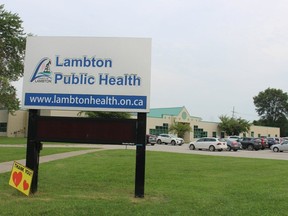
Public health officials are warning people using opioid drugs to be cautious, after recent reports about an increase in opioid-related overdoses and deaths.
Advertisement 2
Article content
Public health was notified of two suspected opioid overdose-related deaths Friday, prompting an advisory with advice about preventing overdoses, and reminding people free overdose-reversing naloxone kits are available from the health unit, local pharmacies, community health centers and other locations, said health unit spokesperson Shaun Bisson.
Article content
Public health has also seen an uptick in opioid-related emergency room visits, emergency medical services calls and deaths since the health unit released its latest update Jan. 22 on the local impact of opioid drug use, like fentanyl, Bisson said.
“We are constantly monitoring the situation locally with our partners in the healthcare system and, as we receive reports of suspected opioid overdoses, there is a rolling average that we’re looking at,” he said.
Advertisement 3
Article content
“When the number gets higher than the average, that generally prompts us to issue an advisory.”
According to regular update Jan. 22, there were 220 opioid overdose-related emergency calls in 2023, including 23 in December.
There were 24 opioid overdose-related deaths in Lambton between January and September 2023, the update from Jan. 22 says, cautioning data about deaths is considered preliminary for up to two years as cases are investigated and confirmed by the provincial chief coroner’s office.
Lambton saw a record-high 43 opioid-related deaths in 2020.
That figure fell to 37 in 2021 and 34 in 2022.
The number of opioid-related emergency department visits to Bluewater Health is currently unavailable because of a cyber attack that affected hospital systems, public health officials said.
Advertisement 4
Article content
Lamnbton medical officer of health Dr. Karalyn Dueck, in a written statement, echoed that public health is constantly working with community partners “to respond to the toxic drug crisis, including opioids.
“Partnership and collaboration are key to making meaningful progress on this complex issue and we will continue to support these efforts through the Lambton Drug and Alcohol Strategy,” Dueck said.
People can take action to prevent opioid-related poisonings, officials said, including:
• don’t mix opioids with alcohol or other drugs;
• don’t use alone;
• know the signs of an opioid overdose;
• and carry a naloxone kit.
Signs of an opioid overdose or opioid toxicity include:
• difficulty walking, talking, or staying awake;
Advertisement 5
Article content
• blue or gray lips and nails;
• very small pupils;
• cold and clammy skin;
• dizziness and confusion;
• extreme drowsiness;
• choking, gurgling, or snoring sounds;
• a person being slow, weak, or not breathing;
• and not being able to wake up, even when shaken or shouted at.
In the event of someone experiencing a suspected opioid overdose, or opioid toxicity, public health asks:
• call 911 and stay at the scene to provide information to paramedics;
• administer naloxone if you have it;
• and know Canada’s Good Samaritan Drug Overdose Act provides immunity from some charges, like possession or breaching parole or probation conditions, to those who call 911 or are at the scene when help arrives for a person suffering an overdose.
Article content